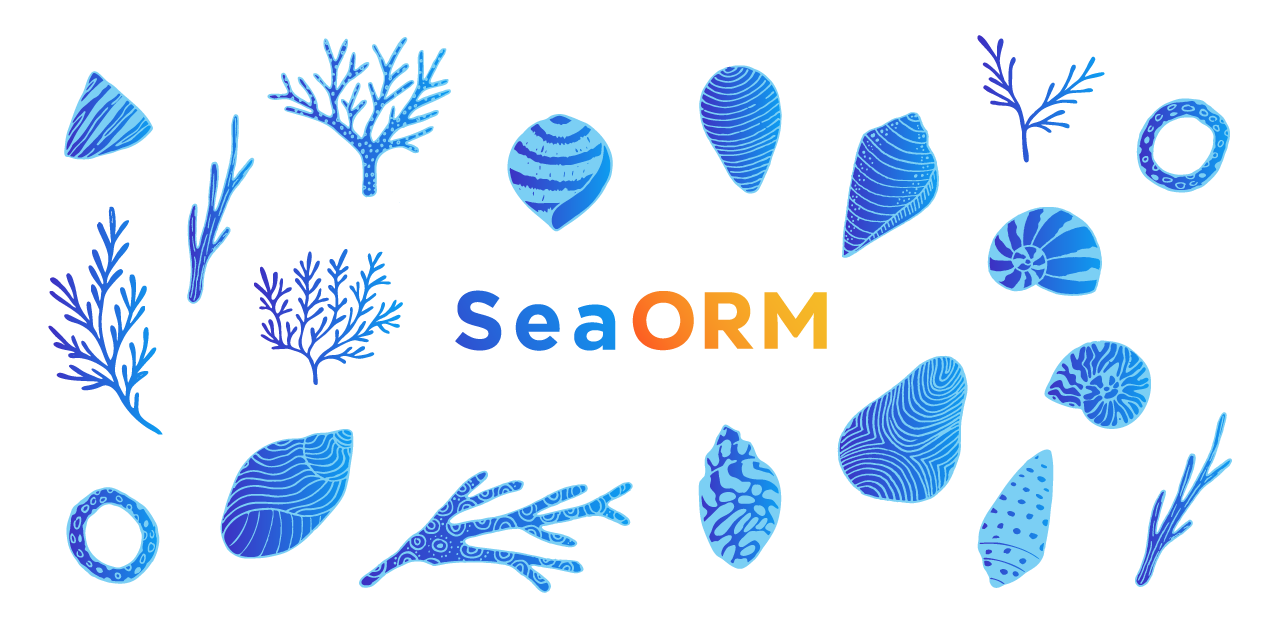Crate sea_orm[−][src]
Expand description
SeaORM
SeaORM is a relational ORM to help you build light weight and concurrent web services in Rust.
Features
-
Async
Relying on SQLx, SeaORM is a new library with async support from day 1.
// execute multiple queries in parallel
let cakes_and_fruits: (Vec<cake::Model>, Vec<fruit::Model>) =
futures::try_join!(Cake::find().all(&db), Fruit::find().all(&db))?;-
Dynamic
Built upon SeaQuery, SeaORM allows you to build complex queries without ‘fighting the ORM’.
// build subquery with ease
let cakes_with_filling: Vec<cake::Model> = cake::Entity::find()
.filter(
Condition::any().add(
cake::Column::Id.in_subquery(
Query::select()
.column(cake_filling::Column::CakeId)
.from(cake_filling::Entity)
.to_owned(),
),
),
)
.all(&db)
.await?;
-
Testable
Use mock connections to write unit tests for your logic.
// Setup mock connection
let db = MockDatabase::new(DbBackend::Postgres)
.append_query_results(vec![
vec![
cake::Model {
id: 1,
name: "New York Cheese".to_owned(),
},
],
])
.into_connection();
// Perform your application logic
assert_eq!(
cake::Entity::find().one(&db).await?,
Some(cake::Model {
id: 1,
name: "New York Cheese".to_owned(),
})
);
// Compare it against the expected transaction log
assert_eq!(
db.into_transaction_log(),
vec![
Transaction::from_sql_and_values(
DbBackend::Postgres,
r#"SELECT "cake"."id", "cake"."name" FROM "cake" LIMIT $1"#,
vec![1u64.into()]
),
]
);-
Service Oriented
Quickly build services that join, filter, sort and paginate data in APIs.
#[get("/?<page>&<posts_per_page>")]
async fn list(
conn: Connection<Db>,
page: Option<usize>,
per_page: Option<usize>,
) -> Template {
// Set page number and items per page
let page = page.unwrap_or(1);
let per_page = per_page.unwrap_or(10);
// Setup paginator
let paginator = Post::find()
.order_by_asc(post::Column::Id)
.paginate(&conn, per_page);
let num_pages = paginator.num_pages().await.unwrap();
// Fetch paginated posts
let posts = paginator
.fetch_page(page - 1)
.await
.expect("could not retrieve posts");
Template::render(
"index",
context! {
page: page,
per_page: per_page,
posts: posts,
num_pages: num_pages,
},
)
}A quick taste of SeaORM
Select
// find all models
let cakes: Vec<cake::Model> = Cake::find().all(db).await?;
// find and filter
let chocolate: Vec<cake::Model> = Cake::find()
.filter(cake::Column::Name.contains("chocolate"))
.all(db)
.await?;
// find one model
let cheese: Option<cake::Model> = Cake::find_by_id(1).one(db).await?;
let cheese: cake::Model = cheese.unwrap();
// find related models (lazy)
let fruits: Vec<fruit::Model> = cheese.find_related(Fruit).all(db).await?;
// find related models (eager)
let cake_with_fruits: Vec<(cake::Model, Vec<fruit::Model>)> =
Cake::find().find_with_related(Fruit).all(db).await?;
Insert
let apple = fruit::ActiveModel {
name: Set("Apple".to_owned()),
..Default::default() // no need to set primary key
};
let pear = fruit::ActiveModel {
name: Set("Pear".to_owned()),
..Default::default()
};
// insert one
let pear = pear.insert(db).await?;
// insert many
Fruit::insert_many(vec![apple, pear]).exec(db).await?;Update
use sea_orm::sea_query::{Expr, Value};
let pear: Option<fruit::Model> = Fruit::find_by_id(1).one(db).await?;
let mut pear: fruit::ActiveModel = pear.unwrap().into();
pear.name = Set("Sweet pear".to_owned());
// update one
let pear: fruit::ActiveModel = pear.update(db).await?;
// update many: UPDATE "fruit" SET "cake_id" = NULL WHERE "fruit"."name" LIKE '%Apple%'
Fruit::update_many()
.col_expr(fruit::Column::CakeId, Expr::value(Value::Int(None)))
.filter(fruit::Column::Name.contains("Apple"))
.exec(db)
.await?;
Save
let banana = fruit::ActiveModel {
id: Unset(None),
name: Set("Banana".to_owned()),
..Default::default()
};
// create, because primary key `id` is `Unset`
let mut banana = banana.save(db).await?;
banana.name = Set("Banana Mongo".to_owned());
// update, because primary key `id` is `Set`
let banana = banana.save(db).await?;
Delete
let orange: Option<fruit::Model> = Fruit::find_by_id(1).one(db).await?;
let orange: fruit::ActiveModel = orange.unwrap().into();
// delete one
fruit::Entity::delete(orange).exec(db).await?;
// or simply
orange.delete(db).await?;
// delete many: DELETE FROM "fruit" WHERE "fruit"."name" LIKE 'Orange'
fruit::Entity::delete_many()
.filter(fruit::Column::Name.contains("Orange"))
.exec(db)
.await?;
Learn More
License
Licensed under either of
- Apache License, Version 2.0 (LICENSE-APACHE or http://www.apache.org/licenses/LICENSE-2.0)
- MIT license (LICENSE-MIT or http://opensource.org/licenses/MIT)
at your option.
Contribution
Unless you explicitly state otherwise, any contribution intentionally submitted for inclusion in the work by you, as defined in the Apache-2.0 license, shall be dual licensed as above, without any additional terms or conditions.
Re-exports
pub use entity::*;pub use error::*;pub use query::*;pub use schema::*;pub use sea_query;pub use sea_strum;Modules
Macros
Structs
Enums
Traits
Identifier
Functions
Type Definitions
Derive Macros
Creates a new type that iterates of the variants of an enum.





